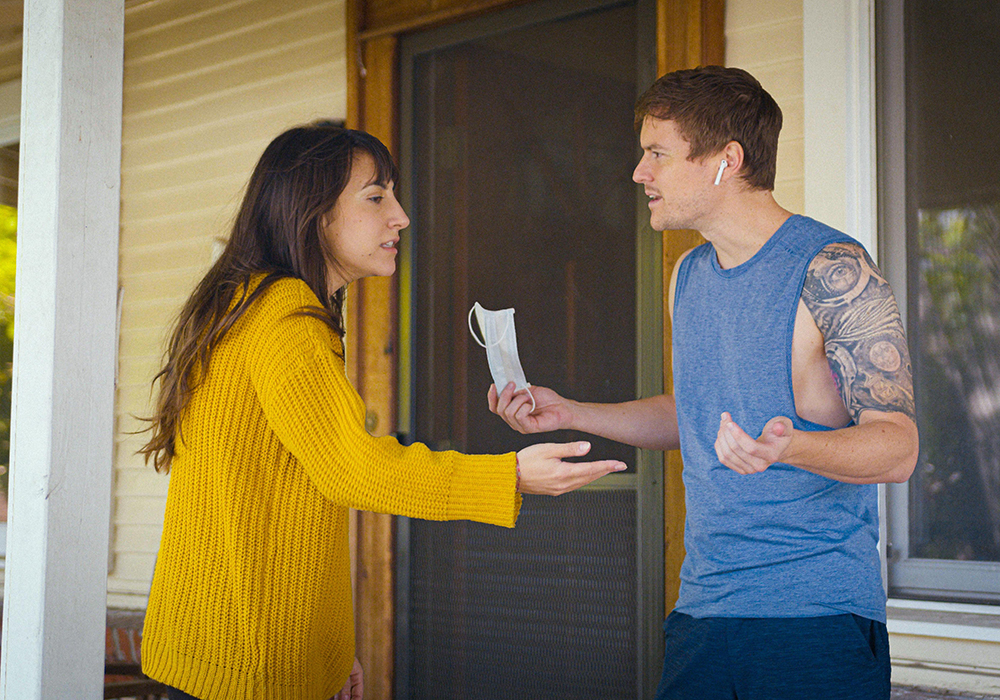There’s a taste of this dynamic in this year’s “Locked Down” with Chiwetel Ejiofor and Anne Hathaway who break up and live together during lockdown. That was a drama but there are commonalities here. “The End Of Us,” directed by Steven Kanter and Henry Loevner, has less pretentious characters, but the situation’s toxicity is still present.
Another common thing is that neither film works incredibly well, which I believe boils down to timeliness as “The End Of Us,” world premiering at this year’s SXSW festival as part of the ‘Narrative Feature Competition,’ depicts the lockdown a year after the fact.
Everything feels dated a year removed—if this were made today there would be way more stimulus jokes—as these characters are still getting accustomed to this world and we’re now a year in and just now starting to roll out vaccines. There are some relatable things (like Leah scrolling through her phone in the mornings checking the COVID death toll), but much of this makes “The End Of Us” feel like a time capsule as the pandemic is so integral to the film.
This isn’t the case with something like the film “Host” about a Zoom séance, as, while that references the pandemic, it’s a film that has more legs since, if you take out the pandemic aspect, you still have a compelling horror narrative.
As a romantic comedy about a broken up couple, it sounds fine, but this film is never laugh-out-loud funny. The chemistry between the pair works fine, but I definitely liked Leah character and Ali Vingiano’s performance more than Ben Coleman as Nick. That’s nothing against him as an actor: his character is simply irritating with his pettiness.
There’s a moment here where the two start to have a prank war, but it’s not funny as he unplugs her wi-fi when he hears her venting on Zoom with her therapist; and when she retaliates by changing the Netflix password, he asks, “What’s your deal, dude?” as if he did nothing. If pettiness and jealousy could be embodied, it would be Nick. There are stints where he’s likable as he builds his chemistry with Leah, but when they’re at odds, the toxicity brought combats the sweetness the film has.

There are some interesting dynamics as Leah tries to enter the dating world and starts seeing an old co-worker, Tim (Derrick Joseph DeBlasis). This relationship has some fine moments, and a main joke about Tim’s character is his film student superiority as he plows through the Criterion channel one movie per day and he has no time for mindless entertainment because, “I actually value my time,” as he puts it. Besides that vexing character trait, he’s totally fine, but he brings the cringe and jealousy out in Nick. This is because it’s a strange situation that they still live together. Are they broken up? Might they get back together?
It hops and back and forth and as it’s confusing for the characters, it’s also confusing for the audience. I sincerely enjoyed the moments where they built romantic chemistry and explored that because that’s when this feels like a good-old-fashioned rom-com that’s chuckle-worthy. Then it reminds us we’re in a pandemic, but some of the most relatable moments come from this aspect, especially Leah’s fear of catching it. There’s a great line where she tries to figure out where she could have contracted it and she says, “There was a neighbour coughing and there was a significant gust of wind that day.”
There are some good parts here and they do stem from the pandemic and how people reacted to the lockdown so differently, and “The End Of Us” is arguably at its best when it explores these two perspectives. “I don’t know how you’re so calm about this,” Leah says to Nick. “I don’t know why you’re so freaked out about it,” he responds. Challenging these viewpoints in light ways like the film does is when it is at its most profound, as it opens the dialogue of how we all first reacted to the threat of lockdown. I wish there were more profound moments like this in the script by Kanter and Loevner, as it often settles for mediocrity.
*”The End of Us” premiered at SXSW at 5 PM CST March 16, and is available to watch through 1 AM on March 21st.


